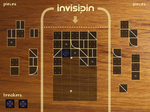invisipin
A pachinko-like puzzle game. Play some balls and watch their movement carefully (i.e. collect data) to reconstruct the board!
Requires pygame and pymunk. One of the files contains pymunk packaged for convenience.
Awards
Scores
Ratings (show detail)
Overall: 4.1
Fun: 3.9
Production: 4.2
Innovation: 4.1
Files
| File | Uploader | Date |
|---|---|---|
|
invisipin_with_pymunk.zip
— final
invisipin. Final entry. Contains pymunk packaged for convenience. |
Tee | 2015/08/15 21:33 |
|
invisipin.zip
— final
invisipin. Final entry. |
Tee | 2015/08/15 21:32 |
|
invisipin-ss.png
invisipin screenshot |
Tee | 2015/08/15 21:30 |
Diary Entries
invisipin: Done
Looks like I'm done, with a couple of hours to spare. Maybe after all these Pyweeks I'm finally figuring out how to manage the scope of my game? Nah...
I'm satisfied with the result. It's my usual stuff: I try to implement some idea or mechanic that I haven't seen around. This one is fairly experimental, so I don't really know how fun it is. Hopefully some of you enjoy it!
invisipin: Postmortem
Thanks a lot for your comments and ratings!
Most of you commented that it was a difficult game, but hopefully it was not too frustrating. On the other hand, one of you solved a large board without using breakers. That's impressive: I found it very hard to solve a large board with two breakers.
It is difficult to balance this game properly. The randomness is a bit hard to control and I think this is the main issue with the game. I put the breakers because I couldn't really control having parts that are not reachable, at least not without spending some substantial amount of time on it. It's possible that you have a bad or good experience simply based on luck. There are probably impossible levels being generated, but hopefully in most of them every tile can be reached with some combination of breakers. The breakers turned out better than I expected, because now there is some strategy on the locations to add breakers if you want to identify lower tiles. I was also worried about another effect of randomness: I was hoping that the random configuration of pieces wouldn't induce the player to make a wrong choice in the beginning, leading to a hard time in the end. No one mentioned that, so hopefully that wasn't an issue.
About the theme: at first I didn't give it a high vote, but now I'm glad it was chosen. There were two ways to view "data" in this Pyweek. Most games chose the "digital data" approach. On the other hand, from a scientific perspective, it is very natural to see data as the information we collect to learn more about something. There is a lot of potential in that interpretation for a game idea. Here, you are doing experiments to discover the structure of the board. My initial idea was to make a mysterious object where you had to do some experiments to find out what it was, but it was too vague and I didn't manage to put it in paper in an interesting way. I decided to restrict myself to experiments that were concrete, specifically observing physics. The pachinko idea followed after I restricted myself to physics. I feel the theme naturally taps on this idea of exploring something unknown, which can lead to some good game ideas.
Speaking of ideas, one of the reasons I prefer Pyweek over shorter game jams such as Ludum Dare is that a week is so much better to think about ideas. This time I didn't touch any code or art for half of the week, partly because I was busy traveling, but partly because I wanted to find the right idea. It's good to let ideas stew in the back of your head. Sometimes the idea never comes, which has often happened to me in previous Pyweeks, but it's really satisfying when you finally get an idea that you are happy with. I knew that this idea would be at least cool to explore, despite not knowing whether it would be fun, and implementing an interesting idea is enough to make me satisfied with my submission (whether it turns out to be fun or not). In the end, this turned out better than I expected.
One last thing: this Pyweek, 20, marks about 10 years since Pyweek 1, back in 2005. Time flies very quickly and I definitely don't have as much time as I used to have back then. I didn't submit a game in Pyweek 1 (though I tried), but I still remember that the theme was "Power" and the idea I tried to implement (stop digital bugs from reaching a power core, which happens to fit in this Pyweek's theme). My first submission was on the second Pyweek. I'm glad that I caught it in the beginning -- it was timed pretty well with the time I was first dabbling in Python. My Pyweek user name happens to be generic because I didn't think Pyweek would end up being so important for me. 10 years later, I'm still here. I'm not a game developer, so I'm very glad that Pyweek exists so I have an excuse to scratch that game development itch that I occasionally have. I look back at the list of games that I made and there are so many good memories, not to mention the great community here.
As always, congratulations to everyone who created a game this Pyweek! Making a game in one week is always a feat. Special thanks to blakeohare for stepping up to host this Pyweek! Thanks to Richard for setting up all the other Pyweeks!
See you all next time!

